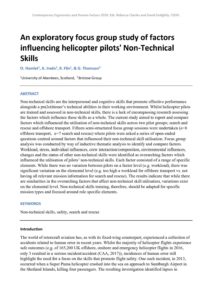| Document | Author O. Hamlet, A. Irwin, R. Flin, & G. Thomson |
| Abstract Non-technical skills are the interpersonal and cognitive skills that promote effective performance alongside a pra2ctitioner’s technical abilities in their working environment. Whilst helicopter pilots are trained and assessed in non-technical skills, there is a lack of encompassing research assessing the factors which influence these skills as a whole. The current study aimed to report and compare factors which influenced the utilisation of non-technical skills across two pilot groups; search and rescue and offshore transport. Fifteen semi-structured focus group sessions were undertaken (n=8 offshore transport, n=7 search and rescue) where pilots were asked a series of open-ended questions centred around factors that influenced their non-technical skill utilisation. Focus group analysis was conducted by way of inductive thematic analysis to identify and compare factors. Workload, stress, individual influences, crew interaction/composition, environmental influences, changes and the status of other non-technical skills were identified as overarching factors which influenced the utilisation of pilots’ non-technical skills. Each factor consisted of a range of specific elements. While there was no variation between pilots on a factor level (e.g. workload), there was significant variation on the elemental level (e.g. too high a workload for offshore transport vs. not having all relevant mission information for search and rescue). The results indicate that while there are similarities in the overarching factors that affect non-technical skill utilisation, variations exist on the elemental level. Non-technical skills training, therefore, should be adapted for specific mission types and focused around role specific elements. |

